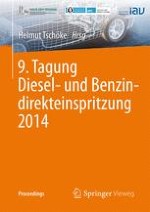2015 | OriginalPaper | Chapter
Gasoline Heated Fuel Injection – A Mechanism for Particulate Reduction and General GDI Engine Optimization
Authors : Gary Bonar, BA, Wolfgang Bullmer, Dipl.-Ing., Chris de Boer, B. Tech. (Hons), Michael Frick, Paul-Benjamin Reinicke, Dipl.-Ing., Michael Riess, Dipl.-Ing., Marc Sens, Dipl.-Ing., Scott Thawley, Dipl.-Ing.
Published in: 9. Tagung Diesel- und Benzindirekteinspritzung 2014
Publisher: Springer Fachmedien Wiesbaden
Activate our intelligent search to find suitable subject content or patents.
Select sections of text to find matching patents with Artificial Intelligence. powered by
Select sections of text to find additional relevant content using AI-assisted search. powered by
Mixture formation in gasoline direct-injection engines is mainly determined by the interaction of air motion and fuel injection spray quality. Injection systems with a wide range of designs are being developed for enhanced spray and mixture quality. The optimization of mixture preparation quality is targeted at increasing the combustion efficiency and at reducing exhaust gas pollutants, especially soot formation and the associated particle number emission. The pressure and temperature of injected fuel play a crucial part in defining spray quality; the effect of increasing injection pressure has on spray quality is basically known. The positive effect that increasing injected fuel temperature has on spray quality and on engine emission has been reported, however, the underlying mechanisms are complex and not well understood. Based on the first promising results from single cylinder SI engine tests a collaborative research project was initiated focusing on the impact of the injection of heated fuel on engine operation. An injector capable of injecting gasoline up to the supercritical condition was designed for installation in a single cylinder research engine. The injector is capable of being operated with fuel temperatures of up to 350°C and fuel pressures up to 300 bar, thus allowing the impact of different fuel temperatures and pressures on the spray formation, combustion process and exhaust pollutants under various engine conditions to be investigated. The paper presents heated fuel spray characterization, spray modeling in CFD and engine test data to show the impact of heated fuel on spray formation and exhaust emissions with spark ignited engine operation. The results from the collaborative project will include high speed spray photography, droplet size measurement, spray modeling in supercritical, vapor and liquid phases for pressure vessel and engine in-cylinder conditions, engine exhaust emissions and optical in-cylinder spray visualization using video endoscopy measurements. The interaction of heated fuel injection with engine variable valve lift and timing operation will also be presented.
